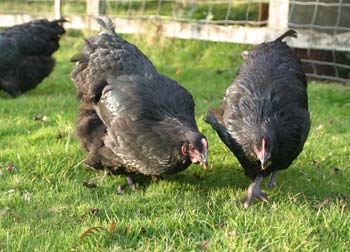We have all heard of the phrase “the pecking order”. Chickens establish a hierarchial order in their flock. This is thought to have evolved over many thousands of years in the jungle fowl of South East Asia. The pecking order allowed the flock to eat in turn and peacefully when food was available. If they were fighting at these times, they would be wasting their opportunity to eat and attracting attention to themselves from predators.
The pecking order is still well and truly with the hens of today and hens can be incredibly cruel to newcomers. If you are mixing hens that aren’t used to one another, you should make sure you are around to keep an eye open for trouble. The following points may help:
- Place newcomers behind a fence or in a small run for a week so that they can get used to their new surroundings and get used to one another.
- Introduce a new hen at night to the coop when it is dark. Place her amongst the other hens. They will not fight in the dark and it will give the others a chance to get used to the new smell.
- If pecking takes place, leave them to get on with it as much as you can. They have to establish the new pecking order but…
- If blood is drawn at any point, remove the hen and try again when the injury has healed. Chickens are attracted to red and will peck blood very quickly.
- You may want to try removing the hen that is fighting with the newcomer to the flock for a little while until the new hen has settled into the flock, then put the trouble maker back in.
If you are still having difficulty with the hens getting along, you can try an Anti-peck spray and if you have real problems, ‘bumpa bits‘ can be fitted to the beak for a while. These stop the end of the beak closing completely so prevent her from causing damage to other hens but she is still able to eat and drink normally.






Hi, i did have 2 chickens but i had to have one put to sleep as she was egg bound, i bought 5 chickens 20 weeks old and these seem to bully the older chicken, they are currently sleeping in separate quarters but i wanted to put the older one in the same coop at night but with light mornings i’m afraid that i will go out and find my older chicken injured! Not sure how to go about it all? would appreciate any advice!!!!
They can be pretty horrible for a week, sometimes two but they will almost always settle down eventually. If you keep her behind wire in or next to their run as a start and then try them in a free range environment where their attention is on foraging, you may find it easier as she will have space to get away from them.
It would be ideal to pop her into a cat basket or similar in the coop so she can still sleep with them and they can get used to her.
If there are a couple of persistent hens that are the bullies, remove them for a week or two and let the new flock form with her first.
Hi, I read the above advice about introducing new chickens to one older resident chook. When you say cat basket, do you mean the sort that you would use to take them to the vet ie totally enclosed?
Thanks so much for your website – very helpful!
Cheers
Catherine
Lake Macdonald, Queensland Australia
Yes, a cat basket you take to the vets. It needs to have some sort of wire / mesh or ventillation slots though so they can see / smell one another.
Ideally, dividing the run in two so they can get used to one another for a while but the cat basket works if you have nothing bigger.
Hi there i was wondering if you could help me i have two hens they are about 8 months old and i also have 4 chicks 2 months old in the day they are in pens side by side but the older hens are pecking and running up to the fence attacking the chicks I’ve tried letting them out all together but the hens just attack the chicks this has been going on for three weeks now do you think they will ever get on…….??? and also how old do chicks have to be before you take them of chick crumb thanking you.
Your chicks should now be on growers pellets – change them over gradually. You should only introduce the youngsters to the hens when they are the same size – so probably around 18 weeks old or so. This will mean they will be big enough to fend for themselves. At the moment they are too small and will be bullied… The run next to one another is really good idea and they will eventually accept one another.
I have two 20 week old hens that I have hatched and brought on and another hen who is now 11 weeks old, they are penned up next to each other but in seperate houses, I want to get them together in the larger coop and run, but the elder hens chase the younger one around the garden when they are let out together, its horrendous, the younger one gets so traumatised, she is terrified. Do I just put them in together and let them get on with it?
gether and let them get on with it now, or will they have to stay apart?
Hi! I was wondering if I got a rooster to mate with one of my hens, if he would mate with all of them? Should I make him his own pen or something? Thanks!
Normally a rooster will mate with the all hens in the flock but sometimes there is the odd one he’s not so keen on, or can have his favourites!
hya I have 12 chickens and introduced two young cockerels last night to them while they were in their pens in the dark roosting, when I went this morning to let them out one of the cockerels was outside the pen and had been nullied by the other hens as soon as i opened the door the chickens attacked him again, what should I do as I want to keep the cockerls but the chickens and horrible with him.
Once the cockerels are mature, they should be able to stand up for themselves however introductions can be difficult and I always keep them side by side with a fence between them for a week before introducing. This way they can get used to seeing and smelling one another.
One cockerel should be enough for your chickens and you will probably find once they are mature and the breeding season starts in the spring, they will fight so I would keep a close eye. You must also keep an eye on the damage they do to the hens feathers as both will be mating with the hens.